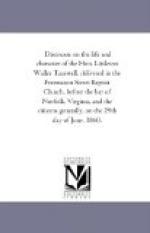His person may be a little above the ordinary height,
well-proportioned, and having the appearance of great
capacity to endure fatigue. His complexion is
swarthy, his muscles relaxed as from intense thought
long continued. His features are all finely developed.
His eyes are large, full, and of a dark blue color,
shaded by thick black brows a little raised, as if
looking on a vast expanse of distant prospect.
A manner firm, manly, dignified, and free.
Vox
permanens verum subrauca; its tremulous and occasionally
interrupted accents give unusual tenderness to its
tones. But it is neither the Ciceronian person,
nor the Chatham face, nor the voice of Antony, that
we are to admire in Mr. Tazewell. It is the great
and clear comprehension; the freshness and rapidity
with which every thing luxuriates on the generous
soil of his mind, which is further removed from even
occasional sterility than in any one I have known.
This soil has no succession of seasons; the sun which
warms it is never for a moment obscured by cloud or
eclipse; there reigns a bright, a genial, a perpetual
summer. His perceptions are as intuitive and as
strong as those of Judge Marshall. He has as much
intrepidity of intellect as Mr. Pinkney, and great
boldness; but no insolence, no exultation of manner.
He wants only ambition to make him rival, nay, perhaps
even to surpass the accomplished champion of the federal
bar. His fault is subtlety, and a provoking minuteness
of detail in his argument. He sometimes shows
legal and rhetorical artifice where there is not the
least occasion for either. These defects, however,
have been acquired in the long habit of addressing
subordinate tribunals, where his genius riots in its
strength, and are so little connected with the original
organization of his mind as to be easily cured.
“There is something absolutely painful in reflecting
on the destiny of this extraordinary man. Endowed
with the best and most various gifts I ever knew concur
in any individual; possessing a vast fund of information,
and indefatigable in whatever he undertakes; he has
a thousand times exhibited talents equal to any occasion,
and is still unknown to the world, and, until lately,
was almost unheard of beyond the limits of his native
State. One may easily reconcile to his philanthropy
that “some mute, inglorious Milton” may
rest in every neglected grove, because it requires
a strong effort of imagination to suppose the clod
of the valley ever to have been “pregnant with
celestial fire;” but we have not this comfort
to allay our mortification, when we see talents of
the purest and brightest ray, united to the noblest
qualities of the human heart, emitting their lustre
in broad daylight, and to the public eye, unnoticed
or forgotten. The sentiment which it excites
in one is not so much sympathy with the object as
regret for the public loss in not appreciating the
rarest gifts of Providence to man. The individual
himself seems too elevated to permit a vulgar pity.




